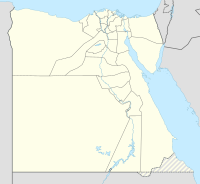| Defence of Outpost Snipe | |||||||
|---|---|---|---|---|---|---|---|
| Part of the Second Battle of El Alamein of the Second World War | |||||||
 El Alamein map | |||||||
| |||||||
| Belligerents | |||||||
|
|
| ||||||
| Commanders and leaders | |||||||
| Victor Turner |
Georg Stumme † Curio Barbasetti | ||||||
| Units involved | |||||||
| |||||||
| Strength | |||||||
| c. 300 | |||||||
| Casualties and losses | |||||||
| 72 | 52–57 armoured vehicles | ||||||
El Alamein, Egypt | |||||||
The Defence of Outpost Snipe in Egypt was part of the Second Battle of El Alamein, part of the Western Desert campaign during the Second World War. On the night of 26/27 October 1942, the 2nd Battalion of the Rifle Brigade (part of the 7th Motor Brigade), with thirteen 6-pounder anti-tank guns and the 239th Battery, 76th (Royal Welch Fusiliers) Anti-Tank Regiment, Royal Artillery, with six more 6-pounders, was ordered to occupy a desert feature known as Snipe, a small depression in the landscape 1.5 mi (2.4 km) south-west of Kidney Ridge that was suitable for an outpost. Once consolidated, it could be used as a jumping-off point for an advance by the 24th Armoured Brigade.
From 26 to 27 October, the 2nd Rifle Brigade defeated numerous Axis armoured counter-attacks and withstood constant artillery bombardments and machine-gun fire, while knocking out 52–57 Axis armoured vehicles, with intermittent support from the tanks and artillery of the 1st Armoured Division. The defence of Outpost Snipe managed to spoil the biggest Axis counter-attack against the positions captured by the Eighth Army during Operation Lightfoot; the battalion suffered 72 casualties. The fighting at Outpost Snipe led Rommel to write that an armoured attack, on ground which the defenders had been able to prepare, was unlikely to succeed.
